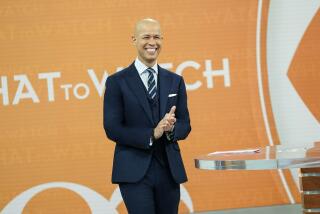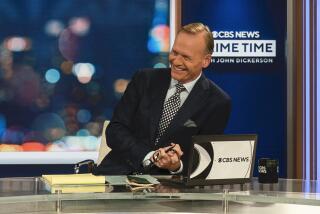Bernie Birnbaum: A ‘Secret Weapon’ at CBS
- Share via
NEW YORK — In 1962, Dan Rather, just up from Texas, was sitting in a CBS office, the new guy sweating out his big break. A short, rotund man with a cigar the size of a trench mortar happened by.
“He looked in, looked at me, stuck out his hand and said, ‘I’m Bernie Birnbaum,’ ” Rather recalled.
Thus did the man who would be anchor meet the man who would be his first producer.
Bernie Birnbaum. Native of Brooklyn. World War II combat cameraman. Rhodes Scholar. And a one-time photographer of Italian starlets who called him Mr. Pencil because he used a pencil, not his hands, to pose them.
Described by Charles Kuralt as “one of the secret weapons of CBS,” Birnbaum has worked for CBS News since 1950, first as a lighting director, then as a film editor, then as a writer and producer.
His journalist’s credo: “Give everybody an even break.” His assessment of his work: “I’m the picture man . . . they learn from me how important the picture is.”
You never see him on TV, though. He’s one of the behind-the-scenes guys, a sturdy CBS legend who has survived wars, hostile Southern sheriffs, management shoot-outs and even the March Massacre of 1987, when 215 CBS News staffers got axed in a budget-cutting move.
Ironically, it was because of the threat of an even larger layoff that he joined CBS after his postwar days in Italy as a publicity photographer of starlets and actors in Italian and American epics.
He was in Hollywood then, seeking employment at a studio. A director friend, Clarence Brown, told him he probably could land him a job, but that there soon would be perhaps 1,500 layoffs in the film business.
“This is a dead-end industry,” director Brown told photographer Birnbaum. He urged him to cast his lot with television, whose increasing audiences were decreasing those for films and causing the layoffs.
Recalls Birnbaum: “I said, ‘Television? What’s that?’ ”
A friend pointed him to New York, where he hooked on with CBS as a lighting director of shows being broadcast--on an experimental basis--in the living color that TV viewers now take for granted.
Later he became a film editor in the news division, working with the likes of the late Charles Collingwood; Shad Northshield, an ex-newspaperman from Chicago who later would create and run what now is “CBS Sunday Morning”; and Kuralt, who anchors that broadcast.
Birnbaum first worked with Rather in Texas on the story of the Billy Sol Estes soybean scandal, then the assassination of President John F. Kennedy in 1963 in Dallas, then the civil rights marches in the South.
His first dealings with the man who became the “CBS Evening News” anchor were uneasy. The Texan from hardscrabble origins distrusted New York types, felt they tended to be Ivy Leaguers afflicted with superiority complexes.
“I told him it wasn’t all that way,” Birnbaum said. “I told him I didn’t go to Harvard or Yale, that I went to City College (of New York) at night before the war and to New York University after it on the GI Bill.”
They got along fine after that.
“Bernie really took me under his wing,” Rather said. “He gave me very good counsel and advice on any number of things.” In addition to being “the ultimate professional,” Rather said, Birnbaum “holds one record that ought to be in the Guinness book. He has saved and made more careers, and never breathed a word of it, than any man who has worked in television news.
“A correspondent gets drunk and can’t finish his script, no problem. Bernie does it. A tape editor’s wife hits him with a frying pan and he can’t show up for work. No problem. Bernie edits.
“I’ve seen whole hours that were total disasters a half day before air. Bernie says, ‘Listen, get me a writer, an editor, time in a room and we’ll get this mother on the air.’ And he does.”
Kuralt said that Birnbaum also has the ability to “gain the trust of anybody because he genuinely is interested” and is himself trustworthy. Kuralt first met Birnbaum in 1960 on a series called “Eyewitness.” Kuralt was the anchor and Birnbaum was a field producer who always, as Kuralt recalls it, seemed in constant motion:
“He thought nothing of going off to Laos for a day or two, then coming back and covering the New Orleans school integration story.”
As with Rather, theirs is a mutual admiration society. The Kurault-Birnbaum dossier includes Vietnam, four “On the Road” retrospectives that Birnbaum put together, the short-lived “American Parade” and “Crossroads” series and the producer’s occasional work for “CBS Sunday Morning.”
“Kuralt’s a goddamn genius,” Birnbaum submits. “He writes to pictures, which very few people do now.”
The producer will be 69 in October, but has slowed only slightly--and then only on doctors’ orders to take two months off this summer and take it easy at his home in suburban Larchmont, N.Y.
In recent years, he has worked on CBS special reports. This year, he produced three one-hour videocassettes of CBS News material--including one based on Kuralt’s 1976 expedition to all 50 states--that CBS will sell both to video-rental stores and via its mail-order videocassette business.
Birnbaum doesn’t wonder what might have happened had he stuck it out in Hollywood instead of joining CBS in New York 39 years ago.
“Naw, I think I’ve had more fun this way,” he said. “And the important thing is that you keep in touch with people.”
He means people whose stories he helped report, people like former Army Sgt. William Floyd, who lost a leg to a booby trap in Vietnam when Birnbaum and Kuralt were there in 1965, filming a special on Christmas in Vietnam.
In a memorable 20-years-later special, the two revisited Floyd in Florida.
“He still sends me Christmas cards,” Birnbaum said. “Those things you never forget. And I had a chance to be close to some of the great moments of history. . . .
“I’m proud I always can say I could go back all the time, go to every story I ever did and be welcome. Because I gave everybody an even break.”
More to Read
The biggest entertainment stories
Get our big stories about Hollywood, film, television, music, arts, culture and more right in your inbox as soon as they publish.
You may occasionally receive promotional content from the Los Angeles Times.










